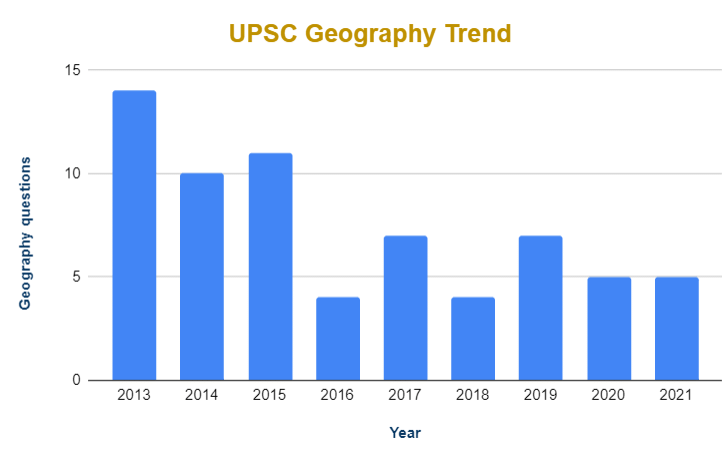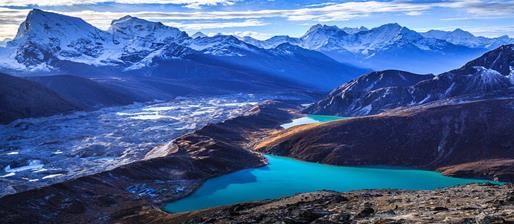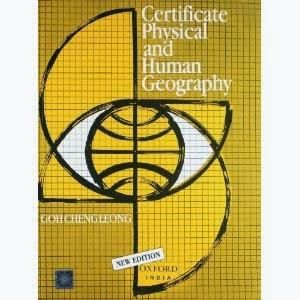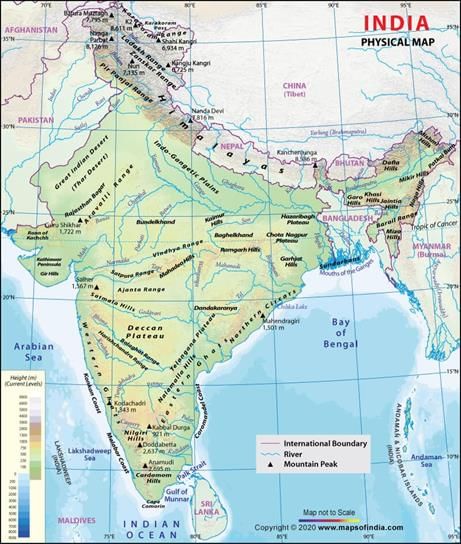Advice to the Aspirants: Geography (Must Read) | Geography for UPSC CSE PDF Download

Our team has mentored thousands of students in the last 3-years, including Anudeep Durishetty AIR 1 UPSC CSE 2017, and one thing that was common among all the toppers is the strategy that they had to prepare for the exam. So, keeping that in mind, we wish to provide you with relevant information as a UPSC Aspirant, helping you to devise your strategy, which would save tonnes of your time and ensure that you get great marks in the exam.
Weightage of Geography in both Prelims and Mains examination
Geography as a module in General Studies has at least 15-20% weightage is given in prelims and 40% weightage in GS PAPER 1 in mains examination. You need to prepare this topic properly as such weightage gives a good chance for your selection in the exam.
EduRev Tip: Time management is important during the preparation and it is advisable to stick to minimal resources as far as possible.

The purpose of this EduRev document is to make you understand how to read Geography as a subject for both the Preliminary and Mains phases of the UPSC civil services examination. By the end of this EduRev document, you will have clarity on how to tackle General Studies Geography. We at EduRev believe in 3R – Read, Revise, and Repeat and we strongly recommend this strategy should be used all along during your preparation.
Geography and interlinkage with other subjects
Geography has ‘overlapping’ topics which covers Environment, Economics (Human geography- Demography), Disaster Management, and Current Events. With this, Geography weightage increases to around 30 to 35% in prelims.
Prima facie it may seem that weightage given to Geography has declined as compared to the pre-2011 times. But that is not the case. You can understand this by solving the questions below;
Which of the pairs given above is/are correctly matched? (UPSC CSE 2018)
Regions sometimes mentioned in news: Country
1. Catalonia : Spain
2. Crimea : Hungary
3. Mindanao : Philippines
4. Oromia : Nigeria
This question, though basically forms part of the current events section but has a direct correlation with Geography.
This question, though basically forms part of the ‘Environment’ section, has a direct correlation with Indian Geography.
Due to the overlapping nature of questions, and the increase in weightage given to the Environment, Geography becomes even more important. Many of these questions can be answered, when basic concepts in Geography are clear.
How and where to start?
Before starting the Geography module, it is mandatory that you should go through the Syllabus. We suggest you get familiar with the Syllabus as having the syllabus at your fingertips is itself 20% of the preparation done. For syllabus, click the link:
UPSC Syllabus for Geography Mains and Prelims
UPSC Syllabus for Geography Optional
Once you are familiar with the syllabus. We suggest you go through the Previous Year Questions and topics of which questions were asked. Understanding the language and topics covered in the exam and how the questions were framed will give you a heads up about what you will be going to deal with in the examination. You can check out the previous year’s questions here.
Previous Year Questions for Geography Prelims
Previous Year Questions for Geography Mains
Importance of Geography as a subject
Geography is a subject that forms part of the main core subjects for the exam. Compared to other subjects there is a lesser chance of choosing the wrong answer once you are clear with your concepts. With its diverse coverage of topics, you will get to learn not just about geography but other subjects as well.
Understanding of Concepts
In geography, it's really important to understand the topic conceptually when you're reading it. We would illustrate this with an example:
Example: The Narmada river flows to the west, while most other large peninsular rivers flow to the east. Why? (UPSC CSE 2013)
1. It occupies a linear rift valley.
2. It flows between the Vindhyas and the Satpuras.
3. The land slopes to the west from Central India.
Select the correct answer using the codes given below.
(a) 1 only
(b) 2 and 3
(c) 1 and 3
(d) None
Correct Answer is Option (a)
Concept: Why does the ‘Narmada river’ is a west-flowing river and not an East?
Fact: Narmada river is a west flowing river.
Think & Learn: (This is for you to ponder over)
- Which are the other west flowing rivers? ·
- Why do some rivers flow West, while the majority flows in the East direction?
- Why do rivers flowing to the East direction form Deltas?
- A general awareness on which ‘States’ they flow and ‘Hydro-electrical Projects’ and ‘Dams’ constructed across these rivers.
By now, from the above examples, you would have understood the following aspects:
- Importance of Geography
- Clarity of Concepts
- Significance of facts
- Level of Difficulty of Questions
Reading a single book multiple times is better than reading multiple books once. – Anudeep Durishetty (AIR 1 – 2018)
Which books to read and How to read them?
The market is flooded with infinite books & notes but if you ask the toppers, each of them will tell you that the syllabus of UPSC is confined within limited books. This is the list of books that were recommended to the toppers including Anudeep Durishetty.
*Please read the books in the chronological order as mentioned below to have a proper path
1. NCERTS 6th to 10th standard: In these books, you will get to understand the basic principles of geography which will provide you with a stronger foundation. These books will help you interlink concepts when you go deep into the subject. You need to start with these books and read it twice. Underline the important points during the second reading as the first reading just introduces you to the concept but you won’t be able to differentiate in the first reading. These books are important for Preliminary examination. There is no need to follow the 3R concept for these books.
You can find Chapter-wise NCERT’s for Class 6 to Class 10 along with online tests for quick revision under NCERT Textbooks & Tests section - Geography for UPSC (Civil Services) Prelims
2. NCERT 11th class (Fundamentals of Physical Geography): This book is considered as the important book in Geography UPSC preparation for both Preliminary and Mains examination. In this book you will read about how continents were formed? How mountains were formed? Etc., This book will provide clarity on the concepts which you read in 6th to 10th textbooks and widens your knowledge base. You need to use the 3R concept in this book. If you want to make notes from this document, try to make it after 3rd reading.

You can find Chapter-wise NCERT’s for Class 11 Geography (Fundamentals of Physical Geography) along with online tests for quick revision under NCERT Textbooks & Tests section -Geography for UPSC (Civil Services) Prelims
3. NCERT 11th class (India- Physical Environment): This book along with the above-mentioned textbook covers a major part of the Geography syllabus for both Preliminary and Mains examination. Above mentioned book (Fundamentals of Physical Geography) covers core concepts as a whole and not as per India’s perspective. In this book, you will read specifically about Indian geography which includes how the Himalayas were formed? What is the climate of our country? Etc., You need to focus on this book especially as 60% of the geography questions in prelims are from Indian geography.
You can find Chapter-wise NCERT’s for Class 11 Geography (India - Physical Environment) along with online tests for quick revision under NCERT Textbooks & Tests section -Geography for UPSC (Civil Services) Prelims
You need to apply the 3R concept in this book also. Notes can be made after 3rd reading.
4. NCERT 12th class (Fundamentals of Human Geography): In this book, you will read about population and its growth, economic activities around the world, etc., The knowledge you gain from this book will not only be useful in Geography but in other subjects such as economy, science, and technology, etc., This book is equally important for both Prelims and Mains. Use the 3R concept in this book also. There is no need to make notes out of this and will explain why you don’t need notes on this book.
You can find Chapter-wise NCERT’s for Class 11 Geography (India - Physical Environment) along with online tests for quick revision under NCERT Textbooks & Tests section -Geography for UPSC (Civil Services) Prelims
5. NCERT 12th class (India – People and Economy): In this book, you will read about the human geography specific to India such as population, resources, agriculture, industries, etc., This book along with the above-mentioned book (Fundamentals of Human Geography) covers the human geography section needed for the exam and there is no need to read any other standard book on this topic. Use the 3R concept for this book also. Notes making is not recommended for this book.
You can find Chapter-wise NCERT’s for Class 12 Geography (India - People and Economy) along with online tests for quick revision under NCERT Textbooks & Tests section -Geography for UPSC (Civil Services) Prelims

6. G. C. Leong (Certificate Physical and Human geography): This book is considered as a substitute for the NCERTS mentioned above. In this book you will read from a worldwide perspective rather than an Indian perspective. We recommend you read this book thoroughly as this book provides additional information that is not present in the NCERTS.
Summary of all the famous books for UPSC exam including GC Leong can be found in this EduRev course - Famous Books for UPSC Exam (Summary & Tests)
7. Refer to Orient Black swan and Oxford for physical atlas and maps.
Also, check out ATLAS: MAP-based learning videos & tests to help you understand, the type of questions being asked in the exam - Geography for UPSC (Civil Services) Prelims
8. For additional information you can refer to the mentioned books;
- Physical Geography by Savindra Singh
- Indian Geography by Dr. Khullar
- Human geography by Majid Hussain
9. Regular Practice: The preparation of UPSC is filled with lots of reading. So, we recommend you to keep practicing online tests regularly, to keep your mind & concepts active. We've provided more than 100+ tests for Geography to help you with that and 500+ tests for overall UPSC preparation in different courses of EduRev.
Geography for UPSC (Civil Services) Prelims
NOTE: As mentioned above why there is no need to make notes on Human geography because it consists of more facts than concepts. A simple gist will do the purpose for those notes. We at EduRev believe in making your preparation easier. Hence, we worked on all the important books for UPSC and made a gist out of it which will make your revision easier. You can access all those documents under NCERT Gist in the Geography Course.
|
175 videos|624 docs|192 tests
|
FAQs on Advice to the Aspirants: Geography (Must Read) - Geography for UPSC CSE
| 1. What is the weightage of Geography in UPSC Prelims and Mains examinations? |  |
| 2. How is Geography interlinked with other subjects in UPSC? |  |
| 3. How should an aspirant start preparing for the Geography section of UPSC? |  |
| 4. Why is Geography an important subject in UPSC? |  |
| 5. Which books should an aspirant read for Geography in UPSC and how should they read them? |  |

















